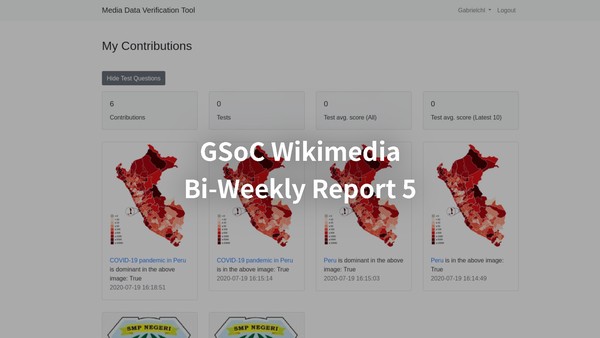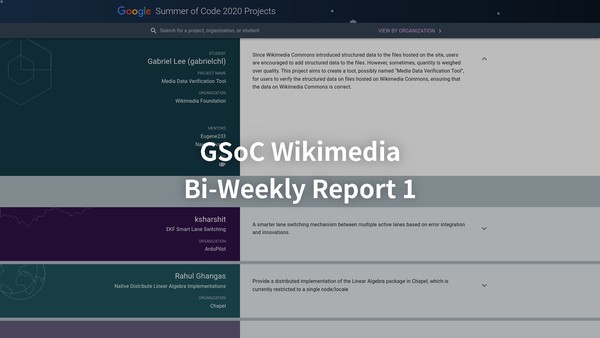Posts
A Short Guide to Getting Started in GSoC
(This is not part of the mandatory bi-weekly report post series. This post targets potential GSoC participants, as a short guide to how to get selected)
Introduction
Well, GSoC ended a few months ago. I said, in my last bi-weekly report, that I’ll publish a post to summarize my project and my experience in the program, so here it is.
A few quick words before the post content begins. All my GSoC-related posts, especially the first one and this one, target any potential future GSoC participants. My aim is that through reading my journey and experience in the program, you’ll be able to understand more about what GSoC is, what it is like, how it works, etc.
GSoC Wikimedia Bi-Weekly Report 8
(This is part of a (mandatory) blog series documenting my experience in GSoC 2020 with Wikimedia Foundation. This series should serve for record-keeping purposes and as a reference for future GSoC students.)
Added: More Test Questions
To prepare the tool for public usage, more test questions were added to make sure that users have test questions to answer when using the tool.
Added: Ability to Post Edits to Wikimedia Commons
One of the most important function of the tool is the ability to post edits to Wikimedia Commons. We’ve added the ability to post depict claims and depict prominence edits to the site.
GSoC Wikimedia Bi-Weekly Report 7
(This is part of a (mandatory) blog series documenting my experience in GSoC 2020 with Wikimedia Foundation. This series should serve for record-keeping purposes and as a reference for future GSoC students.)
Added:Test Cases
We’ve added test cases using the module unittest to most route or util functions in all blueprints.
Added:Moved Question Texts to Server
We wanted to focus all translation-needed strings to be on the server’s side, instead of on the client’s side. So we moved the question texts to the server, which is now available through an API call (/api/get-question-text).
GSoC Wikimedia Bi-Weekly Report 6
(This is part of a (mandatory) blog series documenting my experience in GSoC 2020 with Wikimedia Foundation. This series should serve for record-keeping purposes and as a reference for future GSoC students.)
Feature Added: Qualifiers
Yay, all frequently used qualifiers added in. (Mainly, to support qualifiers, we added those new question types to the system.)
Feature Added: i18n
Yeah, internationalization was added, using flask-babel and flask-babel-js.
We’re probably gonna try and add French and maybe Traditional Chinese first.

GSoC Wikimedia Bi-Weekly Report 5
(This is part of a (mandatory) blog series documenting my experience in GSoC 2020 with Wikimedia Foundation. This series should serve for record-keeping purposes and as a reference for future GSoC students.)
Feature Added: Contributions Page
As promised last week, here comes the contributions page, showing which questions, along with the collected answers, were answered by the user.
Feature Added: Qualifier – Prominence
Adding qualifiers support to the tool would be a pretty huge task, and is probably the last huge task before our team move onto code testing, internationalization and stuff like that. These 2 weeks, I started working on qualifiers, starting with prominence.
GSoC Wikimedia Bi-Weekly Report 4
(This is part of a (mandatory) blog series documenting my experience in GSoC 2020 with Wikimedia Foundation. This series should serve for record-keeping purposes and as a reference for future GSoC students.)
Feature Added: Test Questions
An important feature of the tool is the ability to make sure that data generated by this tool is as accurate as possible. One way data might not be as accurate as they would be would be due to data input error caused by users while using our tool.
GSoC Wikimedia Bi-Weekly Report 3
(This is part of a (mandatory) blog series documenting my experience in GSoC 2020 with Wikimedia Foundation. This series should serve for record-keeping purposes and as a reference for future GSoC students.)
Coding Begins
So, the Community Bonding Period ended, marking the start of a new chapter – coding (the fun stuff).
With everything (or at least most) laid out and planned, I dived right into the code with very high confidence that I’ll smash that thing.
GSoC Wikimedia Bi-Weekly Report 2
(This is part of a (mandatory) blog series documenting my experience in GSoC 2020 with Wikimedia Foundation. This series should serve for record-keeping purposes and as a reference for future GSoC students.)
Community Consultation
Before we dive into coding, we decided that we had a few questions that we wanted to ask our community, our future possible users for some opinion on that new tool to be developed. For that purpose, a questionnaire was created and the link to it was posted on the Commons Village Pump.

GSoC Wikimedia Bi-Weekly Report 1
(This is part of a (mandatory) blog series documenting my experience in GSoC 2020 with Wikimedia Foundation. This series should serve for record-keeping purposes and as a reference for future GSoC students.)
The Application Process
It’s 1:59 am Hong Kong Time on 5th May, my alarm woke me up and I scrambled to grab my phone. With my heart beating faster and faster, I went to the GSoC website and checked my email inbox. Well, I got selected, yay, lol. I stayed excited about a few minutes before I decided that I should go back to sleep, xd.